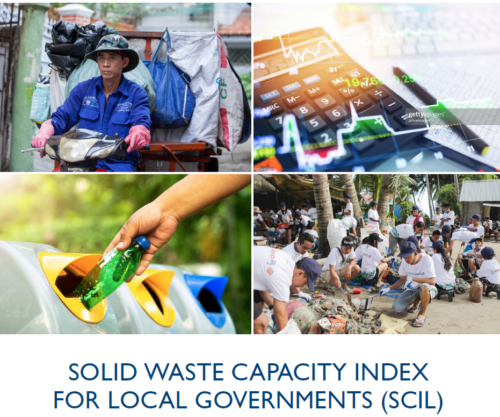CCBO Launches New Capacity Building Tool for Local Governments

More than 22 million tons of plastic leak into our aquatic environment each year, the majority from land-based sources in communities and cities that aren’t able to adequately collect and manage local waste. Local governments have an important role in providing on-the-ground services to control waste and prevent ocean plastic pollution, but often do not have the institutional capacity (skills, resources, infrastructure, knowledge, and ability) to successfully plan, build, and operate these systems.
On December 14, 2022, USAID’s Clean Cities, Blue Ocean (CCBO) program launched a new tool, the Solid Waste Capacity Index for Local Governments (SCIL – pronounced SKILL), that helps local governments assess and improve their capacity to develop and implement robust solid waste management (SWM) systems, so they can effectively manage waste in their cities and advance local circular economies.
The SCIL can be used as a first step in building a more robust local SWM system, helping local governments to prioritize areas where they lack capacity and providing a roadmap to make the process of strengthening the city’s waste system less overwhelming. The SCIL enables local governments to do a self-assessment of a city’s current capabilities and pinpoint areas of improvement needed to develop and maintain a sustainable SWM system. The process brings together a committee of staff across local government agencies to work as a team and break down extremely complex systems into workable parts through a six-component approach— planning, policy and legal frameworks, financial management, service delivery, human resources, and community engagement—to evaluate their current capabilities in these areas.
By answering a series of “yes” or “no” questions, the tool provides local governments with a SCIL score. From this, the committee can then develop recommendations that can help government officials to methodically and collectively determine priority areas for improvement that are most critical for the overall SWM system.
Once an assessment is conducted, the SCIL provides a numerical score that enables local governments to evaluate and transparently report its status with respect to its capacity, and—when done again over time—can provide a monitoring and evaluation tool to measure progress.
“Local governments need to be strong, empowered, and capable to implement solid waste management regulations, plans, and operate effective and efficient local systems. That is why Clean Cities, Blue Ocean centers its approach on supporting cities and other local governments—strengthening their staff and systems using a series of tools. Today, we are proud to launch SCIL — a tool that has already shown to benefit numerous partner cities that have piloted it,” said Clare Romanik, USAID’s Lead Ocean Plastics and Urban Advisor.
The SCIL has been piloted in four languages across seven countries in Asia, Latin America, and the Caribbean.
The program’s SCIL Toolkit provides a downloadable version of the SCIL Assessment Tool, as well as an Implementation Guide and other supporting materials. The Toolkit can be accessed here. For more information on the SCIL, please view CCBO’s SCIL webinar, which features remarks and guidance from CCBO partners who have conducted SCIL assessments in their cities.

